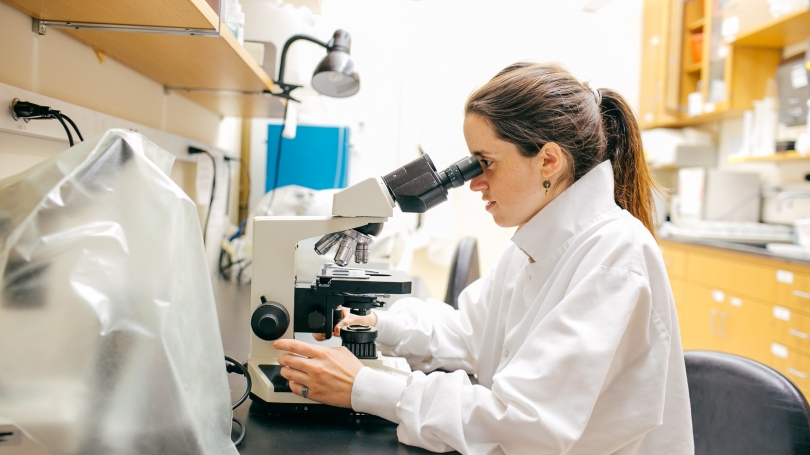
Graduate student Nicole DeAngeli conducting research in a PBS lab. (Photo credit: Dartmouth College/Robert Gill)
- Undergraduate
- Graduate
- Research
- Community
- News & Events
- People
Back to Top Nav
Back to Top Nav
Back to Top Nav
Back to Top Nav
The Graduate Program in Psychological and Brain Sciences is divided into three programmatic groups: Social and Affective Neuroscience; Cognitive and Computational Neuroscience; and Systems and Behavioral Neuroscience. Although most requirements are similar for the three groups, each group can set independent requirements beyond the minimum standards set by the Psychological and Brain Sciences Graduate Program. Regardless of the group in which the student completes his/her training, the student will receive his/her PhD in Psychological and Brain Science. Students who complete additional requirements can opt to receive their PhD in Cognitive Neuroscience. For a list of specific faculty and their current research interests, please visit our people page.
Social psychologists study how individuals think and act in their social worlds. The faculty within our department are active researchers on the topics of self-regulation, social cognition, mood and emotion, health behaviors, and social perception. The social psychology program at Dartmouth emphasizes understanding the social brain using behavioral measures and neuroscience methods such as functional and structural brain imaging and evoked brain potentials. In addition, research is conducted using a variety of experimental and nonexperimental designs in laboratory and applied settings. Many research projects in this area are supported by grants from the National Institutes of Health (e.g., NIDA, NIMH, NIA) and the National Science Foundation. Graduate students often collaborate with other faculty in the social brain sciences interest group, which includes faculty in cognitive neuroscience, education, and philosophy, as well as faculty from the medical school.
The Cognitive and Computational Neuroscience Group is concerned with how the brain controls the mind. The exploration of the mind is interdisciplinary, and also includes scholars from areas such as computer science, biology, neurology, psychiatry, physics, education and philosophy. Research areas include the cognitive and neural basis of perception, attention, memory, language, executive function and the frontal lobes, cognitive development and plasticity, evolutionary perspectives on the brain, and the problem of consciousness. Methodological approaches represented within the group include behavioral and neuroimaging studies with human subjects, including neurological patients, as well as computational, neural net, and mathematical modeling. An interdisciplinary Ph.D. in Cognitive Neuroscience is available through the Department of Psychological and Brain Sciences.
The Systems and Behavioral Neuroscience Group focuses on the neural systems and mechanisms that control behavior. The task of the behavioral neuroscientist is to explain behavior in physiological terms, and he/she must be expert in both behavior and neurobiology. Thus, PhD students in systems and behavioral neuroscience will receive multidisciplinary training in behavioral theory and technique and in a broad range of neuroscience topics, including neurotransmission, neurophysiology, sensory and motor systems, regulatory and reward processes, and higher cognitive functions. Many important areas of research are represented by the faculty and are funded by the National Institutes of Health, National Science Foundation, and other agencies. Examples include neural basis of attention, decision making and executive control of behavior, reward, spatial cognition, habit formation, learning and memory, developmental psychobiology, emotion, hormonal regulation of social behaviors, sensory processing, and pain and addiction. Researchers use a variety of complementary and cutting-edge behavioral and neurobiological methods including in vivo single and multi-channel electrophysiology, optogenetics/pharmacogenetics, neuroanatomical and histochemical techniques, neuropharmacology, and sophisticated behavioral analysis. Students also have the opportunity to participate in interdisciplinary research with faculty in the Center for Cognitive Neuroscience and through collaborations with the Neuroscience Center at Dartmouth.